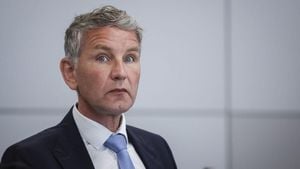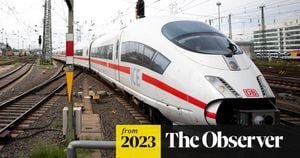South Korea is witnessing significant political turbulence as the nation grapples with protests, economic challenges, and wavering public trust. The air is thick with discontent as citizens voice their concerns about government policies and economic prospects, leading to a volatile situation not only politically but also economically.
Recently, South Koreans took to the streets, fueled by frustration over rising living costs and what they view as ineffective governmental responses to their grievances. The demonstrations often spotlight the administration's perceived failures, particularly surrounding housing prices and inflation, which have pushed many families to the brink. For many, the government's promised solutions feel disjointed from their everyday reality.
The backdrop to these protests is South Korea's economy, which has been showing signs of strain. High inflation rates, particularly concerning food and housing, have made basic necessities difficult for many households to afford. According to the Bank of Korea, inflation is expected to remain above desired levels for the foreseeable future, which has sent ripples of anxiety through the market. The market's reaction has been telling — stock prices have fluctuated, and the won has seen depreciation against the dollar, reflecting investors' worries about policy stability and economic recovery.
Adding to this turmoil is President Yoon Suk Yeol's approval rating, which has suffered significantly during his tenure. Public dissatisfaction has grown, driven by various factors including his handling of the economy, relations with neighboring countries, and social issues. Recent polls indicate his approval ratings have dropped to the lowest since he took office, highlighting the growing disconnect between governmental actions and public expectations.
Critics argue President Yoon's administration lacks effective communication and transparency. Much of this discontent seems rooted not just around policies but around the perceived elitism of the ruling party and its inability to empathize with ordinary citizens. Many South Koreans feel their voices have not been heard, and this sentiment has fueled protests, with citizens expressing desperation for attention to urgent matters like jobs, housing, and social programs.
International observers have begun to take notice of South Korea's situation, with some experts cautioning about the potential long-term impacts on geopolitical stability within the region. North Korea's unpredictable behavior also looms large over South Korean politics, compounding concerns about security and diplomatic relations. The Yoon administration faces the challenge of managing public sentiment domestically, especially amid such complex regional dynamics.
Economic analysts have pointed to the need for decisive and transparent reforms to address inflation and restore public faith. They suggest the government should prioritize investments aimed at housing affordability and job creation, alongside bolstering support for vulnerable communities. Innovative policies may offer pathways toward healing public discontent, but will the administration act swiftly enough to curb the rising waves of protest?
The market's performance is often seen as a barometer of public sentiment – and right now, it seems uneasy. Financial markets are responding to the political disarray with volatility. Investors are skittish; they want assurance of stability before committing funds. Companies are feeling the pressure, with many wondering if proposed government policies can translate effectively to concrete action on the ground.
The focus remains on what lies ahead for South Korea. Will the government be able to quell the unrest, or will dissent continue to grow? Political experts fear prolonged instability could hamper economic recovery and damage South Korea’s standing on the global stage.
Looking closely at the economic factors, the global trends impacting South Korea cannot be ignored. Rising energy prices and supply chain disruptions are playing significant roles, affecting margins and profitability for South Korean firms. The nation's heavy reliance on exports puts it at the mercy of international markets, leaving many to question how domestic policies can improve or adapt amid such external pressures.
South Koreans are rightfully demanding accountability and action, and their calls for reform resonate deeply amid widespread disillusionment. The protests are far more than mere expressions of frustration; they're manifestations of emotional and financial unrest. Community leaders are stepping up, rallying citizens not just to protest but to engage constructively with their representatives.
Despite the challenges, there's hope. South Koreans are known for their resilience and innovation. If the government takes heed and strives for reforms guided by public needs, there's potential for renewed trust and stability. The world will be watching closely to see how this situation evolves, knowing the ripple effects could reach far beyond the Korean peninsula.
What remains undoubtedly clear is this: the actions of South Korea's government will matter immensely, now more than ever, as the country stands at this pivotal juncture. For the South Korean people, their future hangs not just on political decisions, but on the tangible realization of real change to reclaim economic stability and public trust.



